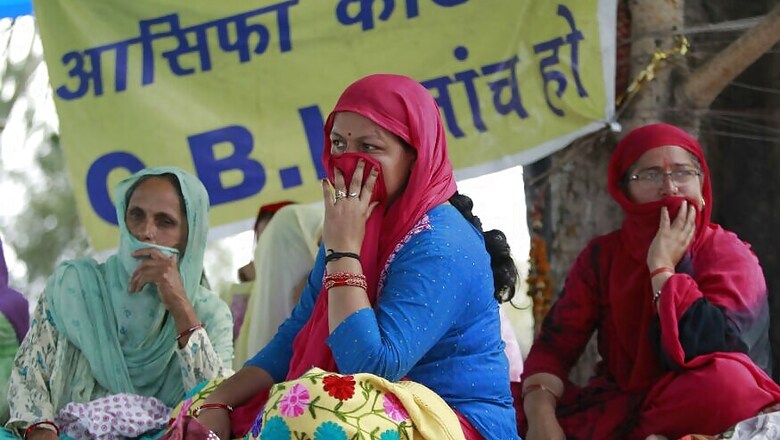
views
New Delhi: Family members of those accused in the rape and murder of an eight-year-old in Jammu’s Kathua have been sitting on a protest since their arrest, demanding an investigation by the Central Bureau of Investigation. Their contention is that the current probe by the state police’s Crime Branch is “biased”. Members of the lawyers’ body in Kathua too has demanded the same. As demand swells for a CBI probe, News18 takes a look at the federal agency’s track record in Jammu and Kashmir.
Shopian Double Rape and Murder
On May 30, 2009, the lifeless bodies of a 17-year-old and her 22-year-old sister-in-law were discovered near the shallow Rambi Ara stream in Shopian, south Kashmir. The two had gone to work on their small orchard across the Rambi Ara the previous day.
On the orders of the district magistrate, a three-member team of doctors was called in from nearby Pulwama district to conduct an autopsy. The team confirmed that both women had been raped. A report issued by the Forensic Science Lab Srinagar also confirmed the rape and murder on June 6, 2009. The family alleged that the women were raped and killed by Indian army men.
After a massive public outrage, the state government handed over the investigation to CBI. However, the agency gave a clean chit to five police officials who had earlier been indicted by a Special Investigation Team (SIT) of the state police that had probed the case earlier.
The CBI attributed the cause of the teen’s death to “asphyxia as a result of ante-mortem drowning” in a stream and said the injuries on her head were “simple in nature, not sufficient to cause death”. In the case of the 22-year-old, the charge-sheet said there were “no ante-mortem injuries” and death was a result of drowning by “asphyxia”.
Pathribal Fake Encounter
In 2003, the CBI took over investigation into the killing of five civilians by Army allegedly in a staged gunfight. The army had picked up the civilians from their homes, killed them and mutilated their bodies beyond recognition before labeling them as Pakistani militants responsible for massacre of 36 Sikhs at Chittisinghpora in 2000.
The CBI in its charge sheet stated that following the killing of Sikhs in Chittisinghpora, the army unit based in the area was under "tremendous psychological pressure" to show results. The CBI indicted personnel of 7 Rashtriya Rifles camped at Shangus in the fake encounter.
The CBI had said the army personnel entered into a criminal conspiracy to pick up some innocent persons and staged an encounter.
The Supreme Court on May 1, 2012 gave the army eight weeks to decide whether the accused should be tried by a regular criminal court or face a court-martial.
On June 29, 2012, the army opted for Court of Inquiry to try the five accused. However, on January 23, 2014, army the closed the case saying the evidence recorded couldn't establish prima facie case against any of the accused.
The families, in April 2016, filed a writ petition in the High Court, seeking re-opening of the case and re-conducting the trial of all the accused in a criminal court. The writ was dismissed.
Later, the families filed the same writ in the Supreme Court, which on August 17 last year issued notice to the Government of India, army and the CBI, rekindling hope among the families of the victims.
The Supreme Court, however, in August 2017, gave a glimmer of hope to the kin of five villagers killed by the army by admitting a plea challenging a Jammu and Kashmir High Court verdict that upheld the Army’s decision to close proceedings against five soldiers involved.
2006 Srinagar Sex Scandal
The CBI had also investigated the infamous 2006 sex scandal in which two ministers, top police officers and several influential people were among those named as accused. They were charged under various sections of the Ranbir Penal Code, the criminal code applicable in the states, including under Section 376 for the rape of a 15-year-old girl.
The other charges included procurement of girls, intimidation of witnesses and wrongful confinement of the victims.
The trial of the 14 accused was shifted from Srinagar to a Chandigarh CBI court on orders of the Supreme Court.
The court acquitted most of the accused and the CBI drew criticism for not following the case meticulously.
In February this year, a woman who was allegedly involved in the sex scandal claimed that the CBI had forced her to change her testimony.
Interestingly, the name of then J&K CM Omar Abdullah had also surfaced in the case, which led to him resigning from the post in July 2009. The governor had eventually rejected his resignation.
Killing of 4 IAF officers in 1990
The CBI also probed the killing of four Indian Air Force personnel on the outskirts of Srinagar on January 25, 1990.
According to an FIR registered in Police Station Sadder, unidentified militants fired upon Air Force employees living as tenants in Rawalpora, Srinagar on January 25, 1990. In the indiscriminate firing, 40 employees, including a woman, were injured, and two died on the spot. The assailants escaped from the spot.
The CBI took up the investigation on the basis of a state government notification in 1990 and a charge-sheet was filed on August 31, 1990 under Section 120-B read with Section 302 of the RPC, Section 3 and 4 of TADA and Section 27 of Arms Act in the court of 3rd Additional Sessions Judge (TADA case Jammu) against the accused persons.
During the course of trial, a transfer application was filed by the accused, which was rejected after which they approached the High Court in Srinagar to transfer the case. The High Court stayed the proceedings of the trial court. For now, the court at Srinagar is hearing the transfer appeal.
The CBI identified JKLF leaders Mohammad Yaseen Malik, Manzoor Ahmed Sofi, Javed Ahmed Mir, Showkat Ahmed Bakshi, Javed Ahmed Zargar and Ali Muhammad Mir, as accused in the case.
Now, the CBI is seeking transfer of the case to Jammu wing of the High Court.
The Mehran Lateef Case
On May 13, 2008, Mehran Lateef Mir, a three-year-old boy, returned home from the school and in the afternoon stepped out of his home to buy sweets from a local shop. That was the last time his mother saw him.
Following High Court directions, the CBI on February 6, 2014 took over investigation in the case.
After relentless investigations that continued for over two years, the CBI found no clues about Mehran’s whereabouts. The case was closed after a city court accepted CBI’s closure report to the effect.
Ten years have passed since with no news of Mehran.

















Comments
0 comment